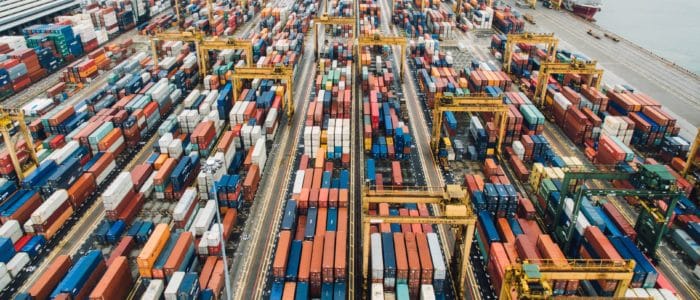Published
COVID, Trade, the G20, WTO and Oscar Wilde
By: Stuart Harbinson
Subjects: European Union WTO and Globalisation

‘Buy American’, ‘Dual Circulation’, ‘Strategic Autonomy’ – these, and similar ideas, have been around or in gestation for some time. They are based on governments’ assessments that their economies should be more self-reliant. We are apparently in an era of deglobalisation.
When the pandemic hit, governments scrambled to secure supplies of PPE, medical equipment and medicines, but quickly realised that they didn’t have sufficient stockpiles and needed to quickly scale up imports of products and components. Bottlenecks in production and logistics led initially to delays.
Many policy makers seized on this as confirmation of their prescriptions. Global supply chains could not be relied on. There was an over-dependence for supplies on China, which was ironically the source of the pandemic. So, policies directed at onshoring, reshoring and near-shoring are obviously right. Right?
Perhaps not. Recent detailed factual analysis by Professor Simon Evenett of the University of St. Gallen in Switzerland sheds new light.
It turns out that, before the pandemic, China was the majority supplier of only a small number of medical goods and medicines to France, Germany, and the United Kingdom, to take these three as an example. Of 154 categories of medical goods and medicines examined, China supplied more than half of these products in only 4 categories for France, and 6 each for Germany and the United Kingdom.
The study also documents 660 trade interventions in medical goods, medicines and food between January and September 2020. Contrary to popular perception, these were split almost evenly between trade restrictive and trade liberalising measures.
The pandemic unleashed a global chasm between demand and supply, with huge spikes in demand for items like PPE. It didn’t matter who made it or where it was made, there just wasn’t enough. Possibly more stockpiling could have partially softened the impact initially, but it is unrealistic to think that stockpiles of sufficient magnitude could have been amassed to cater for the massive overnight increase in demand.
Within a remarkably short time, supplies of medical equipment and medicines were ramped up to meet the enormous demand. It looks, on reflection, as if trade and global supply chains have been part of the solution to the crisis and not its cause. Generally, the trading system performed much better than might have been expected.
This is not to say that the status quo will be maintained. In many cases, in response to the trade war and other commercial considerations, supply chains are already reconfiguring.
As we know, the WTO is in a crisis of its own. Its rule-making, negotiating and dispute settlement functions have withered away against the background of a cacophony of views as to the Organization’s purpose and direction. ‘WTO Reform’ has become a cause célèbre but is too often seen as a means to effect reform of the trade policies of other countries. There is insufficient sense of collective responsibility among the big players.
This is mirrored in the G20, whose Leaders meet virtually on 21-22 November. To its credit, the Saudi Presidency launched a ‘Riyadh Initiative on the Future of the WTO’. Although well-intended, concrete deliverables are in short supply. The G20 countries have portrayed themselves as mechanics who have the technical expertise to fix the car crash in the WTO, conveniently overlooking the fact that their hands were on the steering wheel when the car crashed.
The pandemic has highlighted the WTO’s limitations as a focal point for monitoring and evaluating trade measures – key building blocks for good crisis management. Although the WTO Secretariat issued many useful reports, notification of national measures by members was patchy, with the result that information often had to be found elsewhere.
Good crisis management also requires leadership. Here again, the WTO has been found wanting. The founding WTO Agreement requires the members to appoint a Director-General, but it has been rudderless this year. To paraphrase Lady Bracknell, a character in Oscar Wilde’s famous play ‘The Importance of Being Earnest’, to lose one Director-General may be regarded as a misfortune, not to appoint another at a time of crisis looks like carelessness.
The WTO clearly has institutional failings, though these are often to be laid at the door of its member governments. They cannot insist on it being a ‘member-driven organization’ unless they are prepared to accept responsibility when it doesn’t work.
In the context of COVID, trade may have been an essential element of the response but this does not mean that the WTO as an institution worked as efficiently as it might have. Transparency needs to be improved through strengthened procedures for notification of national trade measures. Some of the initial national responses to the pandemic also highlighted well known inadequacies in the rules on export restrictions. When the virus struck, it seriously inhibited the WTO’s capacity to respond quickly through its deliberative organs and Secretariat.
Looking ahead, much more remains to be done. The WTO can contribute actively to the next phase by working with other international organizations like the World Health Organization and World Intellectual Property Organization to facilitate access to vaccines and medicines around the world. It also needs to consider the implications for trade rules of the extensive subsidies rolled out by the richer countries as part of their response.
Unfortunately, the current crisis will not be the last of its kind. The WTO should draw on recent experience to learn important lessons for future crisis management.
The main lesson to be drawn is surely that global problems require global solutions. Now, more than ever, international economic cooperation is in everyone’s interest. In trade, that means rebuilding the WTO.